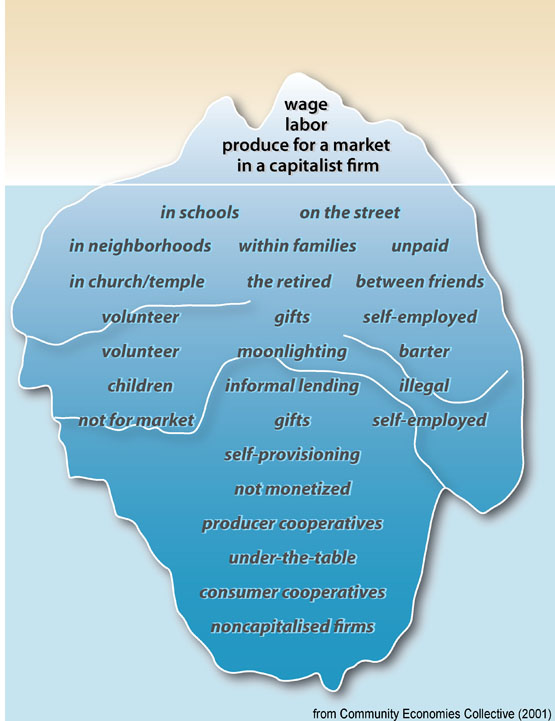| What are Economies ? Diverse Economies Framework DEF Local Economic Inventory Strengthening Diverse Economies |
What are Economies?Economies involve all human activities that produce, distribute, exchange and consume goods and services. Economic activities bring people into relation with each other and with their environment to forge ways of living. There are many different ways in which people arrange livelihoods and economic systems of interaction and interdependence. The Yesterday Survey: An Exercise in Economic MappingThis exercise can be done by individuals in a group. It can be spoken or written down.
Mainstream Views of EconomyThe mainstream view is that an economy run on capitalist lines is the most efficient and progressive. In a capitalist economy production facilities are privately owned, individual wage workers are employed by business owners, goods and services are produced for market exchange and consumers purchase the goods and services they need to sustain themselves with money. Most economic theory that seeks to explain how economies work focuses on enterprise ownership, investment in business, commodity prices, wage levels, consumption patterns and market fluctuations. Economies are seen to be guided by impersonal laws of supply and demand, growth and competition and survival involves bowing to these laws. Currently mainstream views of economy are being challenged by those who take into account the environmental and social costs of privately owned economic growth. The model of economy presented by the mainstream view is now seen by many as unsustainable. See the Resources section to view a variety of alternative representations of the economy.
On the Ground Views of EconomyOn the ground very different views of economy prevail. The majority of the world's inhabitants sustain livelihoods with a range of activities that rarely enter into mainstream thinking about economies. Immediate needs are met by unpaid household and neighbourhood labour and by transactions that include giving, reciprocity, sharing as well as non-monetized exchange. Goods and services are produced in family and communal enterprises and surplus is distributed according to many different rules and traditional understandings. The persistence of these economic activities and their role in sustaining lives cannot be explained by impersonal economic laws. These practices are an outcome of ethical decisions that are consciously and unconsciously made by people as they respond to human needs and environmental gifts and constraints. Currently local people in particular places are looking for ways of ensuring the sustainability of their livelihoods. We propose that an expanded view of economy is useful as a starting point for discussing new pathways for economic development that might afford more sustainable futures. Seeing the Diverse Economy as an Iceberg
Above the water line are the visible activities that we all see as the real economy--paid work, market exchange, capitalist enterprises. Below the water line are all the other activities that also keep us alive, fed, sheltered, cared for and connected to each other. The contribution of these activities is often hidden and unrecognized. Many of these practices deliver well-being directly and need to be safe-guarded. Some of these activities are illegal, they undermine community well-being and need to be controlled. Our economy is what we make it. We have the right to build a local economy that is just, cares for all and protects our environmental and social commons. Finding out about our local diverse economy is the first step towards building on its assets. The Diverse Economies Framework or DEF helps you to do this. |
